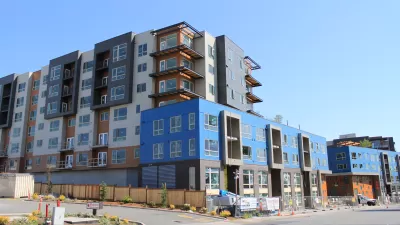A California real estate group aims to capitalize on cheap foreclosures, collecting homes en masse thanks to a semi-automated decisionmaking system.
Hot on the heels of Fannie Mae's plan to turn foreclosures into rental homes, Oakland-based Waypoint Real Estate Group is preparing to buy homes on an unprecedented scale. The firm has bought about 1,200 homes since 2008, and plans to acquire 10,000 to 15,000 by the end of next year.
"Nobody has ever tried this on such a large scale," writes Rich, "and critics worry these new investors could face big challenges managing large portfolios of dispersed rental houses. Typically, landlords tend to be individuals or small firms that own just a handful of homes."
Waypoint owes its breakneck pace to an aggressively automated process for appraising homes: the firm sends inspectors out to over 20 properties a day, crunching information about the condition of the house into an iPad to get the inspector out the door with an estimated cost of renovation in roughly 20 minutes. Waypoint co-founder Colin Wiel likens the system to a production line: "We think this is a huge opportuity and we are going to treat it like a factory."
In spite of concerns over the risks of managing so many properties, communities may benefit from the large-scale acquisitions. "If you have a lot of foreclosures in one community you will improve everybody's home values if you take them off the market," said Diane Swonk, the chief economist at Mesirow Financial. "If those homes are renovated and even rented, it is a lot better than having them stand empty."
FULL STORY: Investors Are Looking to Buy Homes by the Thousands

Planetizen Federal Action Tracker
A weekly monitor of how Trump’s orders and actions are impacting planners and planning in America.

Map: Where Senate Republicans Want to Sell Your Public Lands
For public land advocates, the Senate Republicans’ proposal to sell millions of acres of public land in the West is “the biggest fight of their careers.”

Restaurant Patios Were a Pandemic Win — Why Were They so Hard to Keep?
Social distancing requirements and changes in travel patterns prompted cities to pilot new uses for street and sidewalk space. Then it got complicated.

Platform Pilsner: Vancouver Transit Agency Releases... a Beer?
TransLink will receive a portion of every sale of the four-pack.

Toronto Weighs Cheaper Transit, Parking Hikes for Major Events
Special event rates would take effect during large festivals, sports games and concerts to ‘discourage driving, manage congestion and free up space for transit.”

Berlin to Consider Car-Free Zone Larger Than Manhattan
The area bound by the 22-mile Ringbahn would still allow 12 uses of a private automobile per year per person, and several other exemptions.
Urban Design for Planners 1: Software Tools
This six-course series explores essential urban design concepts using open source software and equips planners with the tools they need to participate fully in the urban design process.
Planning for Universal Design
Learn the tools for implementing Universal Design in planning regulations.
Heyer Gruel & Associates PA
JM Goldson LLC
Custer County Colorado
City of Camden Redevelopment Agency
City of Astoria
Transportation Research & Education Center (TREC) at Portland State University
Camden Redevelopment Agency
City of Claremont
Municipality of Princeton (NJ)




























